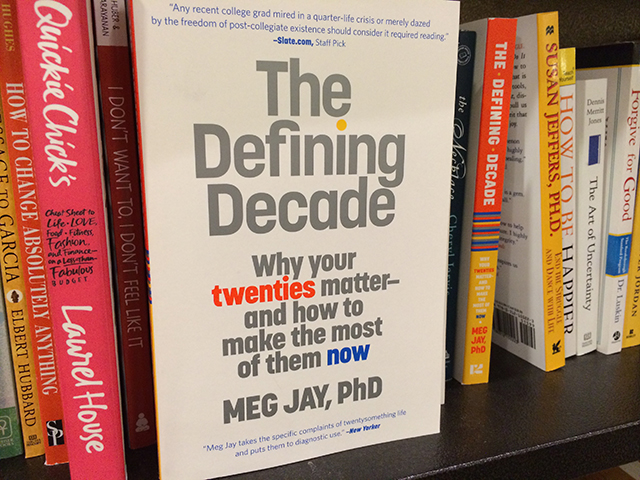
The defining decade — AKA your twenties. Unlike what we have heard, 30 is not the new 20 and the twenties can’t be ignored or thrown away.
Psychologist Meg Jay not only believes this, but wrote a book and delivered a TED talk on the subject. The book The Defining Decade was one of the best and most inspiring books I have read (and I read a lot of books).The book is broken into three core parts: work, love, and the brain & the body.
The book gives advice then reinforces said advice with stories of clients that Dr. Jay has worked with. I will highlight a few chapters in each section.
Work
1. Identity Capital: Dr. Jay writes, “Identity capital is our collection of personal assets. It is the repertoire of individual resources that we assemble over time.” Dr. Jay talks about our need to invest in identity capital. Some identity capital is related to work, think your job and degrees. While other identity capital is personal to you, think how you look and how you speak.
Identity capital can be built by working, focusing on what you are good at and continuing to get better at it. Identity capital can also be obtained by getting involved in your community and serving in leadership positions in young professional groups.
Dr. Jay also talks a lot about underemployment in our twenties. She recommends not getting ‘stuck’ in jobs that you know are not a good fit for you. Begin to own your long term career now.
2. Weak Ties: She writes, “Weak ties are the people we have met, or are connected to somehow, but do not currently know well.” Weak ties help to connect us and open doors for us and it is crucial that we utilize them.
Draw on your weak ties to help you get your foot in the door at a company. Or to help you serve in a leadership role in an organization you are volunteering with.
3. My Life Should Look Better on Facebook: I don’t know about you, but I think it is easy to get caught up in what other people are doing via Facebook. It is easy to worry about the status of your own work life or love life because other people your age are further ahead than you are. But, let’s be honest, we put our best foot forward on Facebook and our online lives are happy and neat. Facebook makes it easy to get caught up in what you should have done differently or what you shouldn’t have done. But according to Dr. Jay, we can’t beat ourselves up with ‘shoulds’ or ‘shouldn’ts.’ Just because someone is doing something on Facebook, it doesn’t mean you should be doing it (or that you even want to be doing it). We need to stop comparing our lives to what others are showing on Facebook. It’s destructive and unhealthy.
Love
1. Being in Like: When dating, you need to be “in like.” Dr. Jay defines this as two things, “being alike in ways that matter and genuinely liking who the other person is.” She goes on to say, “we sometimes hear that opposites attract, and maybe they do for a hookup. More often, similarity is the essence of compatibility.”
When thinking about dating (which at this age in our lives can so easily lead to marriage), we need to think about how similar we are to our partners. How much do we really enjoy their company? Are we compatible for the long-term? Ask yourself these questions before diving deeper into the relationship.
The Brain and the Body
1. Forward Thinking: I have become a bit of a brain nerd, and I love learning about the brain and why we do the things we do. The brain develops from the bottom to the top and from the back to the front. The pre-frontal cortex (the part of the brain that allows us to plan ahead, the place where reason, judgment and impulse control lives) develops last into our early twenties. There are two parts in our life in which our brain goes through massive development and the second of those is during our twenty-something years.
During this time, everything we do is easier to learn and prepares us for the rest of our lives. Dr Jay says, “Twenty-something relations are prepping us for marriage and other partnerships. Twenty-something plans help us think across the years and decades ahead. How we learn to cope with twenty-something setbacks readies us for handling our spouses and bosses and children.”
Whoever you want to become and whatever you want to do, invest in those things now. It will be significantly easier if you do it now than if you wait until you enter your thirties. The last chapter of the book, Getting Along and Getting Ahead, continues this point, “We now know that, of any time in life, our twenties are our best change for change.”
Dr. Jay has summarized her findings in a TED talk as well that we here at GenTwenty love to watch (but as with movies, the book is better)! If you haven’t read the book, get it now! It is well worth your money and time.
[Tweet ““We now know that, of any time in life, our twenties are our best change for change.” Dr Meg Jay”]
